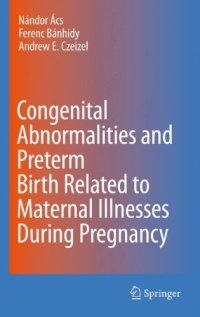
Ebook: Congenital Abnormalities and Preterm Birth Related to Maternal Illnesses During Pregnancy
- Tags: Maternal and Child Health, Health Promotion and Disease Prevention, Obstetrics/Perinatology, Public Health, Epidemiology, Biomedicine general
- Year: 2010
- Publisher: Springer Netherlands
- Edition: 1
- Language: English
- pdf
This book provides the analysis of a uniquely large, population-based data set evaluating congenital anomalies as a consequence of maternal diseases. The possible adverse birth outcomes of babies born to mothers diagnosed with important diseases have not yet been evaluated in such a material by the same method. The greatest merit of these studies is that by analyzing their data the authors managed to identify some new previously unknown associations between maternal diseases and adverse birth outcomes. The first aim of the authors was to summarize 50 years of experiences in human teratology which may help younger experts to use them. The second objective was to show the methodological weaknesses of previous studies and to recommend the use of up-to-date methods when designing new studies. A surveillance database like the one used in these studies effectively helps to monitor the most important indicators of adverse birth outcomes such as congenital anomalies, preterm births, and low birth weight, to evaluate the efficacy of medical care of pregnant women, and to detect possible causes of adverse birth outcomes in order to help in their prevention. In addition, the analysis of cost-benefit of this database showed that the benefit is much higher than cost. This book may be useful in the daily practice for obstetricians, paediatricians, general practitioners and epidemiologists, moreover it could be used in the training programmes of medical students and residents as well.
This book provides the analysis of a uniquely large, population-based data set evaluating congenital anomalies as a consequence of maternal diseases. The possible adverse birth outcomes of babies born to mothers diagnosed with important diseases have not yet been evaluated in such a material by the same method. The greatest merit of these studies is that by analyzing their data the authors managed to identify some new previously unknown associations between maternal diseases and adverse birth outcomes. The first aim of the authors was to summarize 50 years of experiences in human teratology which may help younger experts to use them. The second objective was to show the methodological weaknesses of previous studies and to recommend the use of up-to-date methods when designing new studies. A surveillance database like the one used in these studies effectively helps to monitor the most important indicators of adverse birth outcomes such as congenital anomalies, preterm births, and low birth weight, to evaluate the efficacy of medical care of pregnant women, and to detect possible causes of adverse birth outcomes in order to help in their prevention. In addition, the analysis of cost-benefit of this database showed that the benefit is much higher than cost. This book may be useful in the daily practice for obstetricians, paediatricians, general practitioners and epidemiologists, moreover it could be used in the training programmes of medical students and residents as well.